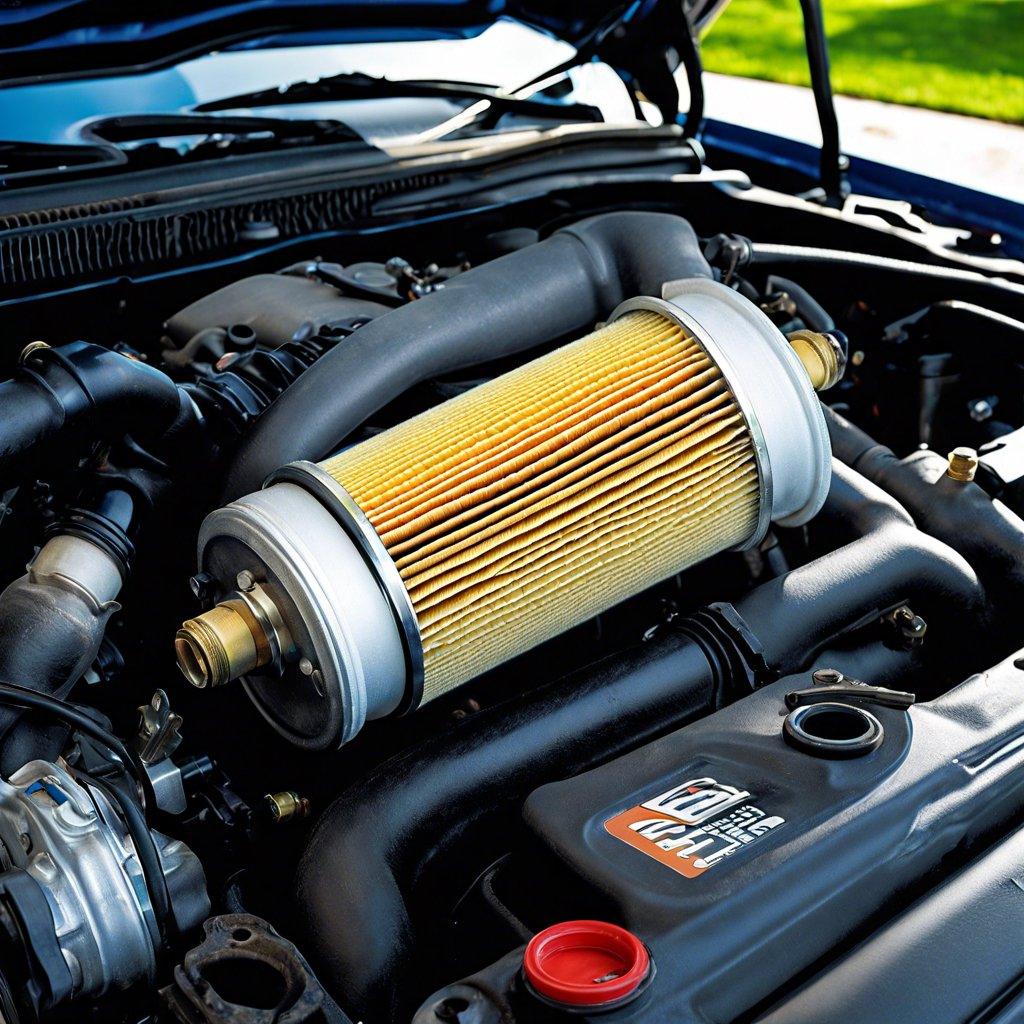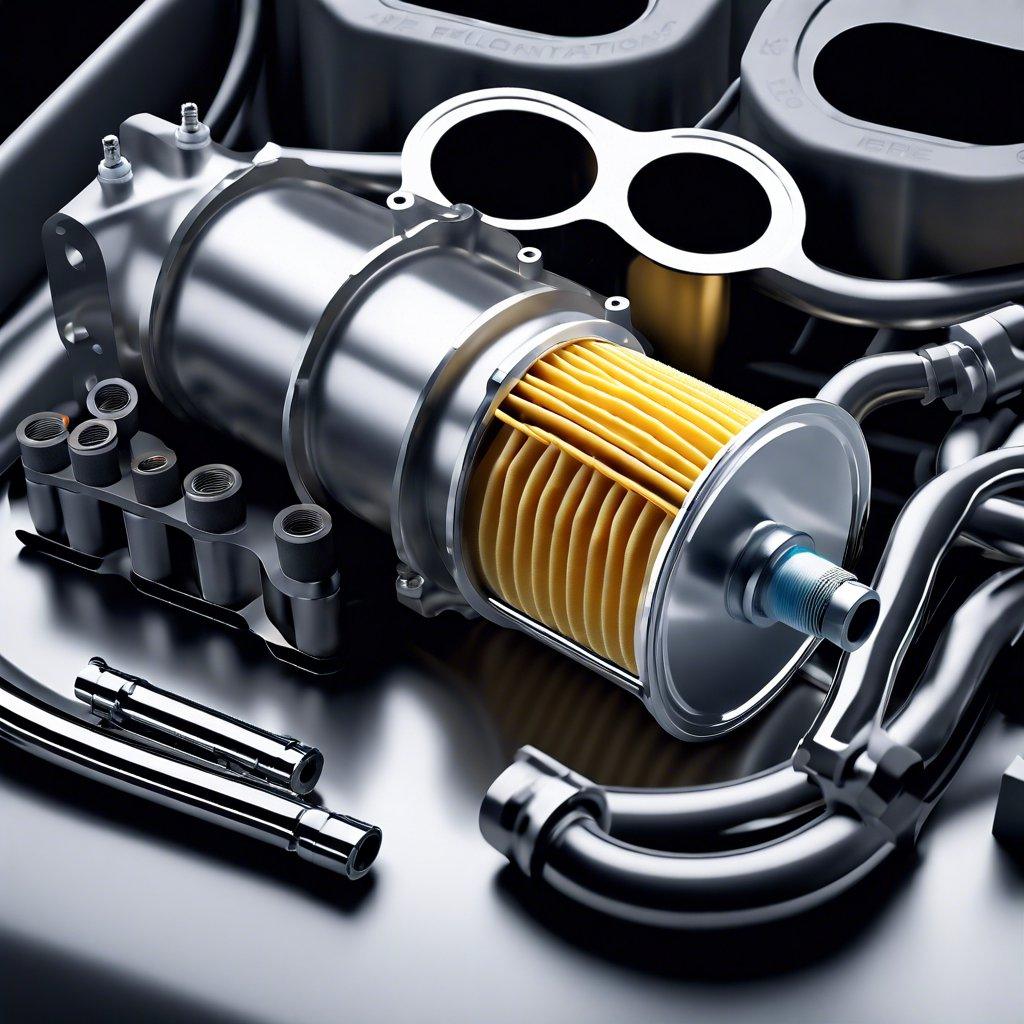Fuel Efficiency and the Fuel Filter: Connecting Performance and Maintenance
Maximizing Fuel Efficiency: The Vital Role of Fuel Filters

In the realm of engineering and technology, the pursuit of fuel efficiency is a paramount concern. One crucial component that plays a pivotal role in this endeavor is the humble fuel filter. This unassuming device holds the key to unlocking optimum engine performance and maximizing fuel economy.
Fuel filters are designed to remove contaminants, such as dirt, rust, and other particulates, from the fuel before it reaches the engine. By maintaining a clean and unobstructed fuel flow, the engine can operate at peak efficiency, delivering optimal power and minimizing fuel consumption.
The importance of fuel filters cannot be overstated. A clogged or malfunctioning fuel filter can lead to a host of problems, including reduced engine power, increased fuel consumption, and even engine damage. Regular fuel filter maintenance is a crucial aspect of vehicle and equipment maintenance, ensuring that the engine receives the clean, uncontaminated fuel it requires for optimal performance.
Maximizing Fuel Efficiency: The Vital Role of Fuel Filters delves into the intricacies of fuel filtration, exploring the direct correlation between fuel filter performance and overall fuel efficiency. Through a comprehensive understanding of this relationship, engineering and technology professionals can implement targeted strategies to optimize their systems and achieve remarkable fuel savings.
- Understand the importance of fuel filter maintenance in maintaining engine performance and fuel efficiency.
- Explore the impact of fuel filter clogging on engine power, fuel consumption, and engine longevity.
- Discover best practices for fuel filter replacement and maintenance to ensure optimal fuel efficiency.
- Gain insights into the latest advancements in fuel filtration technology and their role in enhancing fuel economy.
| Fuel Filter Maintenance Interval | Recommended Replacement |
|---|---|
| Light-Duty Vehicles | Every 12,000-24,000 miles or 12-24 months |
| Heavy-Duty Vehicles | Every 6,000-12,000 miles or 6-12 months |
| Off-Road Equipment | Every 500-1,000 hours of operation |
By understanding the vital role of fuel filters in maximizing fuel efficiency, engineering and technology professionals can make informed decisions and implement strategies that drive significant improvements in their operations. Embracing the power of fuel filtration is a crucial step towards a more sustainable and cost-effective future.
Unlocking Engine Performance: How Fuel Filters Contribute to Optimal Functioning
Understanding the Crucial Role of Fuel Filters
Fuel filters play a vital role in maintaining the optimal performance and efficiency of an engine. These unsung heroes of the automotive world ensure that the fuel delivered to the engine is free from contaminants, preserving the integrity of critical engine components and unlocking the full potential of the vehicle.
The Impact of Fuel Contaminants
Fuel can contain a variety of impurities, such as dirt, rust, and other particulates, that can wreak havoc on an engine’s delicate components. Without a functioning fuel filter, these contaminants can clog fuel injectors, restrict fuel flow, and even cause significant damage to the fuel pump and other sensitive components. This not only reduces engine performance but also compromises fuel efficiency, leading to increased fuel consumption and higher operating costs.
Fuel Filters: The First Line of Defense
Fuel filters are designed to capture these harmful contaminants before they can enter the engine, ensuring a clean and consistent fuel supply. By trapping these impurities, fuel filters protect the engine from wear and tear, maintaining optimal combustion and preserving the engine’s efficiency over time.
Maintaining Optimal Fuel Filter Performance
To ensure the continued effectiveness of fuel filters, it is essential to adhere to the recommended replacement intervals specified by the vehicle manufacturer. Neglecting fuel filter maintenance can result in a gradual decline in engine performance, decreased fuel efficiency, and, in some cases, even catastrophic engine failure.
The Importance of Regular Fuel Filter Replacement
Regular fuel filter replacement is a simple yet crucial maintenance task that can have a significant impact on the overall performance and longevity of an engine. By investing in timely fuel filter changes, engineering and technology professionals can unlock the true potential of their vehicles, optimizing fuel efficiency, reducing operating costs, and ensuring the long-term reliability of their engine systems.
Fuel filters are the unsung heroes of engine performance, playing a vital role in maintaining optimal fuel efficiency and engine function. By understanding the importance of fuel filter maintenance and adhering to recommended replacement intervals, engineering and technology professionals can ensure their vehicles operate at peak performance, maximizing productivity and minimizing operating costs.
Fuel Filters: The Unsung Heroes of Fuel Efficiency and Engine Longevity
Understanding the Importance of Fuel Filters
Fuel filters are often overlooked components in the maintenance of modern vehicles, yet they play a crucial role in ensuring fuel efficiency and engine longevity. These unsung heroes of the automotive world are responsible for removing impurities and contaminants from the fuel, protecting the sensitive components of the engine from damage.
The Impact of Fuel Filters on Fuel Efficiency
A clogged or inefficient fuel filter can significantly impact a vehicle’s fuel efficiency. When the filter becomes blocked, it restricts the flow of fuel to the engine, leading to increased fuel consumption and reduced power output. This, in turn, can result in decreased acceleration, reduced top speed, and overall diminished performance.
Maintaining Engine Longevity with Fuel Filters
In addition to their role in fuel efficiency, fuel filters also contribute to the longevity of the engine. By removing contaminants from the fuel, they prevent the buildup of deposits in the fuel injectors, carburetors, and other sensitive components. This helps to maintain optimal engine performance and reduces the risk of costly repairs down the line.
To ensure the continued efficiency and protection of the engine, it is essential to replace the fuel filter at the recommended intervals. Failure to do so can lead to a gradual decline in fuel efficiency, decreased engine performance, and even potential engine damage.
Fuel Filters and Emerging Technologies
As vehicle technology continues to evolve, the role of fuel filters becomes even more critical. Modern engines, with their advanced fuel injection systems and tighter tolerances, are increasingly reliant on the consistent and reliable performance of the fuel filter to maintain optimal efficiency and longevity.
Fuel filters may be the unsung heroes of the automotive world, but their importance cannot be overstated. By understanding the critical role they play in maintaining fuel efficiency and engine longevity, engineering and technology employees can better appreciate the value of regular fuel filter maintenance and replacement. Investing in the health of these humble components can contribute significantly to the overall performance and lifespan of any vehicle.
Achieving Peak Performance: Fuel Filters as the Cornerstone of Fuel Efficiency
The Vital Role of Fuel Filters in Maintaining Fuel Efficiency
Fuel efficiency is a critical aspect of modern engine performance, and the fuel filter plays a crucial role in ensuring optimal efficiency. As the gatekeeper between the fuel tank and the engine, the fuel filter is responsible for removing impurities and contaminants that can compromise fuel quality and ultimately affect engine performance.
Understanding the Impact of Fuel Contaminants
Fuel contaminants, such as dirt, rust, and water, can accumulate in the fuel system over time, leading to a range of issues that can significantly impact fuel efficiency. These impurities can clog injectors, restrict fuel flow, and cause premature wear on critical engine components, all of which contribute to a decline in fuel economy.
Fuel Filters: The Cornerstone of Fuel Efficiency
Fuel filters are designed to capture these contaminants before they reach the engine, ensuring a clean and consistent fuel supply. By maintaining a high-quality fuel flow, fuel filters help to optimize combustion, reduce engine wear, and maintain peak performance, all of which contribute to improved fuel efficiency.
Proper Maintenance: The Key to Sustained Fuel Efficiency
Regularly replacing the fuel filter is essential for maintaining fuel efficiency. As the filter accumulates debris, its ability to effectively remove contaminants diminishes, leading to a gradual decline in engine performance and fuel economy. By following the manufacturer’s recommended replacement schedule, you can ensure that your vehicle’s fuel system continues to operate at its best, delivering consistent and reliable fuel efficiency.
Optimizing Fuel Efficiency: A Holistic Approach
While the fuel filter is a critical component in the fuel efficiency equation, it is important to consider other factors that can impact fuel economy, such as engine maintenance, tire pressure, and driving habits. By adopting a comprehensive approach to vehicle maintenance and optimization, you can unlock the full potential of your engine’s fuel efficiency and enjoy the benefits of reduced fuel consumption and emissions.
| Key Benefits of Proper Fuel Filter Maintenance |
|---|
|




Post Comment